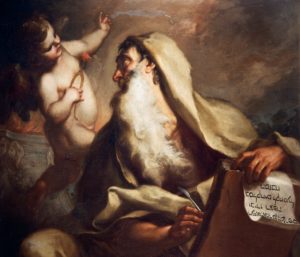Close your eyes and count to three. Then open them and focus on one stationary object.
Where’s the light coming from, and how does it reflect off the object? Where are the shadows? What is the object’s depth—could you calculate it in inches or feet? How accurate do you think your calculation is? How are you estimating it? Would the object still be recognizable if you reduced it to two dimensions (in other words, if you drew it)? Can you imagine how the object would appear if you are looking straight down at it from above?
Finally: What color is it?
Are you sure?
These appear to be questions about perception, but actually they are questions about philosophy. In fact, one of the very first philosophy questions is, if we perceive the world around us through our senses, can our senses be trusted?

The “Problem of Color” has plagued both scientists and philosophers for centuries—or that’s what Mazviita Chirimuuta says, in a provocative piece called “The Reality of Color Is Perception.” At first the title proposition seems obvious: Why, sure. Light reaches our eyes in wavelengths and the brain perceives those various frequencies as color. But . . . does that mean there really is no such thing as “color”? That color is not a real property of the things we see, but it’s all in our head? Or does color consist of some objective quality of the light? What is color?
Scientific theories tend to lean in a subjective or objective angle. Color is either a brain phenomenon or it’s a light phenomenon. But there’s another theory, the “relationist” theory, that sees it as both. Janus, the Roman god of time, serves as a metaphor because he looks both forward and back—the two-faced god. Likewise, color relates both to the objective world and to the individual mind.
Ms. Chirmuuta likes that idea: “This is a common thread in scientific writing on color vision and it has always struck me that the Janus-facedness of color is its most beguiling quality.”
She goes on: “Indeed, I argue, colors are not properties of minds (visual experiences), objects, or lights, but of perceptual processes—interactions that involve all three terms.” In that way, color perception is the same kind of process as consciousness itself. “[C]onsciousness is not confined to the brain but is somehow ‘in between’ the mind and our ordinary physical surroundings, and . . . must be understood in terms of activities.”
Let’s say then that color is mind, object, and light. Three perspectives, one phenomenon that we associate with recognize lilacs, sunsets, oceans, autumn.
Consciousness is mind, world, communication. Three perspectives, one process. St. Augustine, without the benefit of an electroscope, defined vision as eye, brain, correlation. Three perspectives, one capacity that most of us never think about.
Object, word, meaning. Frequency, ear, music. Father, Son, Spirit—is anyone seeing a pattern here? Maybe I’m just being philosophical, but once you’ve adopted a Trinitarian Creator you see Him echoed everywhere.
In the comments section below the article, one snarky responder calls out “the arrogance of philosophers who don’t know their place as they are just pseudo scientists filling the valleys and cracks of ignorance until real knowledge makes them obsolete.” As for that plaguey problem of consciousness: “all philosophy has to offer there is confusion as well which will try to persist after inquisitive scientists have solved that puzzle too.”
Might be a long wait.



 What’s your idea of a hero? Is there anyone today, in the military or the sports world, who looks like a hero to you? To a nation that had been longing for the ideal king to lead them and a “Mighty man” to look up to, David fit that description: the teenage boy holding up the head of a giant, the captain who had “slain his ten thousands,” the loyal subject who became a generous monarch, the chief shepherd of his people who made them feel like somebody.
What’s your idea of a hero? Is there anyone today, in the military or the sports world, who looks like a hero to you? To a nation that had been longing for the ideal king to lead them and a “Mighty man” to look up to, David fit that description: the teenage boy holding up the head of a giant, the captain who had “slain his ten thousands,” the loyal subject who became a generous monarch, the chief shepherd of his people who made them feel like somebody.

 “The nation” is now a kingdom. King Saul, as it happened, was a prelude. Now the true king appears, the one God had in mind all along. Every Sunday-school child knows about the boy who killed the nine-foot giant with a single stone, and the shepherd who killed predators with nothing but a stick and his bare hands. David is also one of the few people in the Bible who receives a physical description. From the minute he appears, it’s as if the Word is saying, “Watch this one: he’s special.” But for all that, David’s purpose and place in salvation history outweighs his person.
“The nation” is now a kingdom. King Saul, as it happened, was a prelude. Now the true king appears, the one God had in mind all along. Every Sunday-school child knows about the boy who killed the nine-foot giant with a single stone, and the shepherd who killed predators with nothing but a stick and his bare hands. David is also one of the few people in the Bible who receives a physical description. From the minute he appears, it’s as if the Word is saying, “Watch this one: he’s special.” But for all that, David’s purpose and place in salvation history outweighs his person.

 Samuel’s speech to the people in I Sam. 8:10-18. You want a king? Here’s what kings do.
Samuel’s speech to the people in I Sam. 8:10-18. You want a king? Here’s what kings do.



 three she was evacuated from London because of the blitz, and lived with two families for most of the duration. Looking back, she can see the seeds planted in her early life, such as an occasional Sunday school, that finally sprouted when she read a gospel tract her husband brought home. It struck like an arrow, filling her heart with joy. She was elated, and believed at once, eagerly kneeling to accept Christ as Savior. Over the years, she’s become more grounded, learning that being a Christian doesn’t solve all your problems. But she’s not going anywhere else. Her favorite verse: “In everything give thanks, for this is the will of God in Christ Jesus concerning you.”
three she was evacuated from London because of the blitz, and lived with two families for most of the duration. Looking back, she can see the seeds planted in her early life, such as an occasional Sunday school, that finally sprouted when she read a gospel tract her husband brought home. It struck like an arrow, filling her heart with joy. She was elated, and believed at once, eagerly kneeling to accept Christ as Savior. Over the years, she’s become more grounded, learning that being a Christian doesn’t solve all your problems. But she’s not going anywhere else. Her favorite verse: “In everything give thanks, for this is the will of God in Christ Jesus concerning you.”
